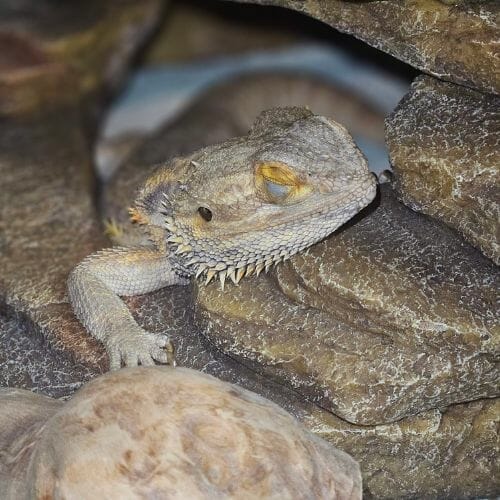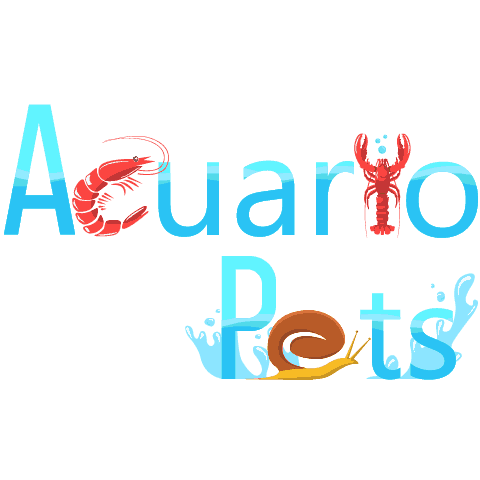This post was created with help from AI tools and carefully reviewed by a human (Muntaseer Rahman) . For more on how we use AI on this site, check out our Editorial Policy.
Check Out These FREE Tools We Made JUST For You!
Why Your Bearded Dragon Is Sleeping All Day? (Brumation or Something Worse)

You wake up excited to feed your bearded dragon, but they’re still in their hide.
Again.
It’s been three days since they’ve eaten, and they’re sleeping like they just ran a marathon. Your mind races: Is this normal? Are they dying? Did you mess up?
Take a breath. Your dragon is probably fine, but let’s figure out what’s actually going on.
What Is Brumation Anyway?
Think of brumation as your bearded dragon’s version of hibernation, except they’re not a complete couch potato.
During brumation, a bearded dragon’s digestion system essentially shuts down, their heart rate drops significantly, and they appear to be in a deep sleep. In the wild, Australian desert winters get too cold for bearded dragons to function normally.
So instead of struggling through the cold months when food is scarce and the sun is weak, they just… check out for a while.
Smart, right?
Studies have shown that bearded dragons allowed to brumate are typically in better physical condition, more active overall, and have longer lifespans. It’s not just about surviving winter – it’s actually good for them.
Classic Signs Your Dragon Is Brumating
They’re Sleeping More Than a Teenager
Before brumation, your bearded dragon is awake and active during the day; you’ll find that they spend most of their time sleeping when they enter brumation.
We’re talking sleeping 20+ hours a day, sometimes for weeks on end.
Food? No Thanks
A dragon wanting to brumate will actively refuse food or certainly make any eating minimal.
This is actually smart on their part because you don’t want a dragon with a belly full of food sleeping for an extended period, as this can cause life-threatening issues with the food not digesting properly and rotting within their digestive system.
They’re Hiding Like They Owe You Money
Your dragon suddenly becomes antisocial, spending all their time in caves, under logs, or burrowed in substrate.
In the wild, bearded dragons usually bury themselves in a small hole or cave to help regulate their body temperature when there are fewer daylight hours and to keep out of sight from prowling predators.
Going to Bed Earlier Than Your Grandma
You may notice that your dragon is wanting to go to bed earlier at night – this could be by 30 minutes or even an hour.
Moving in Slow Motion
When they do wake up, they move like they’re underwater.
Everything is sluggish and deliberate.

Your Beardie Has More to Say…
This article tells you WHAT to do, but do you know WHY your dragon needs it? Or what they’re thinking when you do it wrong?
Read the full rant (all 20 chapters of it) in: “What Your Bearded Dragon Wishes You Knew”
*Told by a very frustrated beardie who’s had ENOUGH of watching you guess.*
When Does This Nightmare Begin?
Here’s the thing: there’s no crystal ball for brumation.
Most bearded dragons don’t start brumating until they are at least ten months to one year old, although they can be difficult to predict when it comes to brumation and may brumate one year but not the next.
You may have heard that bearded dragons under the age of one year old do not brumate – this is not the case. The urge to brumate can happen at any age because it’s stamped in their DNA.
As for timing, bearded dragons usually start brumating in late fall or early winter when the days get shorter and the temperatures drop.
But your dragon didn’t read the manual, so they might decide to brumate in July. Or not at all. Dragons are weird like that.
How Long Will They Ghost You?
This is where it gets frustrating.
Brumation can last anywhere from a few weeks to a few months. Factors such as the individual dragon’s age, overall health, and environmental conditions can influence the exact duration.
Some dragons take a quick three-week power nap. Others disappear for six months.
There’s literally no way to predict it, which is maddening for anxious owners checking on their dragons every five minutes.
Hold Up – Is It Actually Brumation or Something Worse?
This is the million-dollar question that keeps reptile owners up at night.
The problem is that brumation symptoms look suspiciously similar to your dragon being sick. So how do you tell the difference?
Weight Loss Is the Red Flag
A healthy bearded dragon won’t lose much weight during brumation – mine have lost around three or four grams on average each time.
In an animal that is sleeping more and not eating, if they lose more than 5-10% of their body weight (5-30 grams), then this is not likely brumation and a veterinary evaluation should be obtained.
Get a kitchen scale and weigh your dragon weekly during brumation. This is non-negotiable.
Check for Physical Symptoms
Brumating dragons look… normal. Just sleepy.
Sunken eyes, extremely slow skin tenting, flaky scarred skin, sticky and tacky mucus membranes, unusual discharges, and a very dry, wrinkled cloaca even right after a soak all require medical attention.
If you see any of these, it’s vet time, not nap time.
The Black Beard Test
Does your bearded dragon show signs of stress like a black beard? Brumating dragons are chill. Sick dragons are stressed.
Weird Body Positioning
A healthy brumating bearded dragon will lay with their torso and legs fully extended or modestly curled inward. However, issues like muscle twisting, contracting, trouble moving specific limbs, dragging tail or body sections, or stargazing with head tilted back all signal underlying health conditions.
Timing Matters
Brumation typically occurs in the fall/winter months when temperatures drop and daylight hours decrease. If lethargy, lack of appetite, or other out-of-normal behaviors manifest suddenly in the spring/summer or anytime the external conditions have not changed, it can indicate sickness rather than natural brumation.
Your dragon sleeping all day in July? Probably not brumation.
But Wait – It Might Be Your Tank Setup
Here’s a plot twist: your dragon might not be brumating OR sick.
They might just be cold and miserable because your tank setup is garbage.
(Sorry, but someone had to say it.)
Temperature Problems
If your bearded dragon is lethargic (sluggish and inactive) and moves very little, it could be a sign of hypothermia.
A basking area should be somewhere between 105 and 110 degrees Fahrenheit (43°C) for babies, while the cooler end of their enclosure should be around 80 to 90 degrees Fahrenheit (32°C).
For adults, basking temp should be between 95 and 100 degrees Fahrenheit.
If the temperature is too cold, or there is not enough or adequate UV lighting available, a bearded dragon will become dull and lethargic.
Incorrect lighting and temps can simulate brumation. So before you assume your dragon is brumating, double-check your setup.
UVB Lighting
Without sufficient vitamin D3, reptiles cannot absorb calcium from their diet, leading to metabolic bone disease and related issues.
Your beardie needs a UVB light that mimics the UVB/UVA radiation they get by basking in the sun.
No proper UVB = lethargic, sick dragon that looks like it’s brumating but is actually just suffering.
The Mandatory Vet Visit
Before you let your dragon brumate, you NEED a vet checkup.
The reasons I always say have a fecal test done via your vet before the process is because the symptoms mentioned above are similar to that of many illnesses or parasite load symptoms a bearded dragon can get.
Bearded dragons on an inadequate diet or harboring intestinal parasites may wake up from brumation and become critically ill.
Parasites will literally eat your dragon from the inside during brumation when there’s no food coming in. They’ll feed off your dragon’s fat stores instead.
That’s nightmare fuel right there.
What to Do When Your Dragon Is Actually Brumating
Make Sure They Poop First
Once the dragon has had its poo in those final days of the temperature reducing routine, turn off the basking bulb and UV, and leave them to sleep.
You can give them a warm bath to help stimulate a bowel movement.
Adjust the Lighting
You should reduce the basking temperatures and daylight hours that you currently provide. Say for example you offer 10-12 hours of UVB and heat currently, you could reduce this by turning it off two hours earlier to simulate the shorter days and cooler temperatures.
Some people turn everything off completely. Others keep it on a reduced schedule. There’s debate about this.
Keep Water Available
A small water bowl (not big enough to lay in) should be available within your setup, regardless.
Brumation is not the same as hibernation, as your dragon will still be awake for part of the day and able to move around. They might wake up occasionally for a drink.
Leave Them Alone (Mostly)
Although there are no set rules for caring for your beardie during brumation, one rule to live by during this period is to try and disturb them as little as possible.
Don’t wake them up for baths every week. Don’t force-feed them. Don’t poke them to see if they’re still alive.
Just let them sleep.
Monitor Their Weight
Weigh them weekly without waking them up too much. If they’re losing significant weight, something’s wrong.
Don’t Feed Them
During brumation, you should not feed your bearded dragon because when a bearded dragon enters brumation with a belly full of food, it calls for worry since digestion barely takes place as all they do is sleep, and the food could rot inside.
You can offer food, but if they refuse, don’t force it.
When They Finally Wake Up
Then one day when you check on them, you will find them up and about, looking at you. Or you will hear them moving around.
It’s that simple. They just… wake up.
When your dragon wakes up, it’s pretty obvious. You may check on her and see her staring wide-eyed back at you, or she may just wander out of her hiding spot and begin crawling around her terrarium in search of food.
Don’t Rush Things
Over the next few days, set the heating and lighting back to normal. Offer little portions of food gradually. You may want to stick with greens and easy-to-digest veggies at first until your dragon’s full appetite comes back.
Expect the first few days of waking up to be slow and sluggish, but trust that your bearded dragon will get back to the swing of things over the next week or two.
Give them a bath for hydration. Start slow with food. Be patient.
Should You Let Them Brumate?
This is controversial, but here’s the consensus: If your bearded dragon wants to brumate – let them!
Skipping brumation can actually be very harmful. Current knowledge suggests that it tends to shorten their lifespan, and bearded dragons that don’t brumate generally don’t thrive as well as those that do.
The exceptions:
- Your dragon is under a year old (though this isn’t a hard rule)
- They have a serious illness or health condition
- They’re underweight or malnourished
- They have parasites
In these cases, talk to your vet about preventing brumation by keeping temperatures high and light cycles normal.
The Bottom Line
Your bearded dragon sleeping all day is either brumation, illness, or poor husbandry. Sometimes it’s obvious which one. Sometimes it’s not.
Here’s your action plan:
- Check your tank setup. Is the temperature right? Is the UVB working? Has it been replaced in the last 6 months?
- Look for physical symptoms. Sunken eyes, black beard, weird positioning, or unusual discharge? Vet. Now.
- Get a fecal test. Rule out parasites before assuming brumation.
- Weigh them weekly. Significant weight loss = not brumation.
- Consider the timing. Is it actually winter, or is your dragon being weird?
- When in doubt, see a vet. Better safe than sorry.
Brumation is natural and normal, but it’s also scary as hell the first time it happens.
The good news is that your bearded dragon was designed to brumate, and as a caring owner, all we can do is ensure that our bearded dragons have the optimal conditions to stay healthy during their winter rest.
They’ve been doing this for millions of years. They know what they’re doing.
You just need to make sure nothing else is going on.
About Author
Hello, I’m Muntaseer Rahman, the owner of AcuarioPets.com. I’m passionate about aquarium pets like shrimps, snails, crabs, and crayfish. I’ve created this website to share my expertise and help you provide better care for these amazing pets.
Disclaimer
This site is owned and operated by Muntaseer Rahman. AcuarioPets.com is a participant in the Amazon Services LLC Associates Program, an affiliate advertising program designed to provide a means for sites to earn advertising fees by advertising and linking to Amazon.com. This site also participates in other affiliate programs and is compensated for referring traffic and business to these companies.

